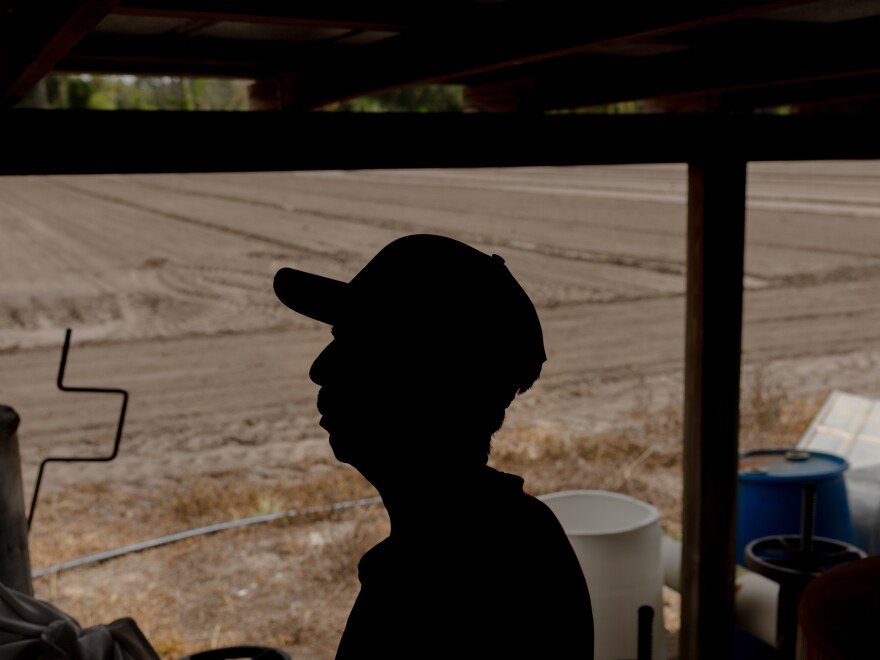The man squints as he gazes out into the vacant field: The sun shines strong in Central Florida at lunchtime. This appears to be a sizable, arid piece of land to the inexperienced eye. But getting the soil ready for planting is one of the most crucial steps in strawberry farming, so that by the following spring, this field will be overflowing with delicious berries.
He regrets that “things changed, almost overnight,” even though he has been farming this property since the 1980s.
He claims that President Trump has suffered a crushing blow as a result of his immigration policies, which include huge detentions and deportations.
“The government is killing farming,” he claims. “This is going to end us.”
F., who is also an immigrant, requested to be addressed solely by his first initial out of fear of reprisals for voicing his disapproval of the administration’s crackdowns around the state: The highway patrol and municipal police are being actively used in the attempt by Florida Governor Ron DeSantis.
Despite the absence of anyone, F. replies, “You just never know where agents are,” lowering his voice. As a farmer, that has required him to cut his staff by almost half.
“A lot of the migrants have left,” he states. “The rest are hiding.”
In an average year, over half of his employees are undocumented. The H2A agricultural visa often provides the other half. However, F. is taking no chances this year: he won’t employ any strawberry pickers who are not authorized to be in the United States.
However, he claims that the expenses have been rising for years and that he cannot afford to hire more H2A visa workers. “I’m drastically cutting down production next year,” he states, “to 35% of what I usually do.”
Trump’s escalating deportation drive will harm the U.S. economy, particularly industries that depend on migrant labor, according to economists. The largest decline in agricultural employment in almost ten years has occurred in the previous four months alone, with a loss of 155,000 jobs.
President Trump has expressed earlier this year the necessity for accommodations for foreign workers in the agricultural industry. He stated, “Our farmers are being hurt badly,” during a mid-June news conference. “They employ excellent people that have been with them for 20 years. Despite not being citizens, they have shown to be excellent. We are unable to capture farms and all of their inhabitants.
Over two months have passed since then.There hasn’t been a change in policy yet. Members of his Cabinet have really continuously advocated for a tough stance ever since. In the beginning of July, Agriculture Secretary Brooke Rollins declared, “The president has been unequivocal that there will be no amnesty.” “Automation is ultimately the solution to this. Additionally, when you consider it, our Medicaid program has 34 million healthy folks. America is full of laborers,” Rollins remarked.
According to farmers NPR spoke with, this notion is absurd.Many claimed that despite paying significantly more than the minimum wage, they have received little applications from Americans. To ensure that American workers had an equal opportunity to apply for jobs, John Walt Boatright, director of government affairs at the American Farm Bureau, said he would remind people that farms must publish their labor needs in order to qualify for an H2A visa. “The interest and the willingness to work on farms has not been there,” according to him. “It hasn’t been there for a long time.”
According to Boatright, the H2A visa system has to be fixed immediately. For farmworkers who are employed here illegally, the Farm Bureau would also like to see a route to citizenship.
Many people in Florida’s agriculture industry are in favor of it.
“I believe that food is a national security issue that the American consumer should be concerned about,” states Jeb Smith, president of the Florida Farm Bureau Federation. “The American public should be concerned whenever there is a risk of not having access to a plentiful, reasonably priced, and safe food supply. We don’t want our food to be reliant on other nations. That could turn out to be a very bad thing. It is risky to experiment with that.
Smith claims that limiting the expense of the H2A visa is his primary concern. He states: “There is a concern about some of our workforce just not being able to function at full capacity,” without going so far as to advocate for a road to citizenship for immigrant workers. That is something we must be really aware of. Regarding deportation, I’m sure that the majority of farmers in our nation concur that while we want a secure border, we also need a skilled labor force and legalization.”
Further west, in the agricultural region of Central Florida, mailboxes with MAGA stickers cling to the rural roads, while Trump flags remain motionless in the muggy heat.
Only if we use his initial, W, would one strawberry grower agree to speak. He fears that opposing the president could hurt his business in this strongly pro-Trump area.
He tells us that while he completely supports the president, he is concerned about the future of his farm as we sit in the shed to avoid the sun. W. states that he wants two things: a route to legalization for workers and reduced costs for the H2A visa. “They need to come up with like, letting these ones who’ve been here for 15-20 years going in and doing their papers right,” he continues. “After all, they have lived here and brought up their families. I am aware that there are some wicked people in the world. However, harmful seeds are present everywhere.
On immigration, he says, lowering his voice to nearly a whisper, that President Trump and Governor DeSantis “might be riding them a little bit hard.”
Copyright 2025 NPR






